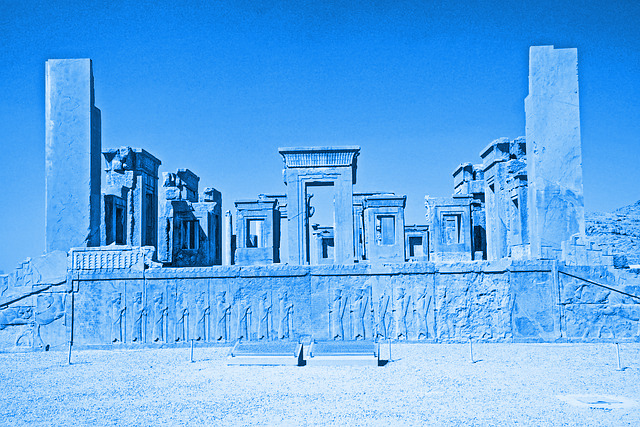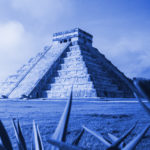The Persian civilisation is one of the oldest and most influential civilisations in history, having reached its peak between the 6th and 4th centuries BC. It played an important role in the course of world history, and its influence is still visible today. For these reasons, studying the history of Persian civilisation is essential for understanding the world today.
Persia has been described to us mainly by the Greek world, whose enemy it was. This antagonism and the various conflicts that took place make us forget that Persia contributed greatly to the construction of the Western identity (by opposition) but also that it played an important role in the exchange of knowledge between the Hellenistic world and its own. If Persia is often described as a barbaric civilisation by the Greeks, it is forgetting that it generated a significant number of discoveries and artistic prowess (notably architectural). Reflecting on Persia means thinking about our relationship with otherness, with the foreigner. It means going beyond the Greek literary “propaganda” which consisted in describing the “people of the East” as individuals without morals or grandeur. The opposite is true; Persia resembles Greece in many ways. It should not be forgotten that Alexander’s conquests tended to spread Hellenistic culture as far north as India. Even if there are important points of disagreement, Greece would perhaps never have become aware of its unity if it had not had a powerful enemy in front of it for many centuries, who gave it a hard time on many occasions.
To Understand The Development Of Political Systems:
The Persian civilisation was an early example of a complex monarchy with an absolute ruler, a bureaucracy and taxation. This system of governance later spread to the Middle East and Europe. The monarchy of divine right was an element of differentiation between Persians and Greeks. The Greeks, although there is in their mythology the notion of the hero, which is the association of the human and the divine, there was no Greek power that took itself for God. Later, with the development of Christianity in Europe, the idea of the God-man had made its way and this is why we will find kings who claimed to be the divine expression on earth, just as in Persia a few dozen centuries earlier (and even more so in Egypt).
Understanding The Development Of Philosophy And Literature:
Persian literature was very influential during this period, and many of the surviving works have become classics. These works helped shape the development of philosophy and literature in the West.
Understanding The Development Of Architecture:
Persian architecture was very advanced, with a style distinct from the rest of the world. Many monuments and sites of the Persian civilisation still stand today, including the ancient city of Persepolis, although it was partly destroyed by Alexander’s soldiers.
Learn More About The Cultural Achievements Of The Civilisation:
Persian culture was very influential during this period and is still visible in many aspects of modern life. Persian language, literature and music are all important cultural achievements of the Persian civilisation.
Understanding The Impact Of Religion:n:
The Persian religion of Zoroastrianism was very influential during this period, and is still practiced in parts of Asia and the Middle East. Understanding this religion is essential to understanding the history of the region.
Understanding The Development Of Mathematics:
The Persian civilisation is credited with the introduction of the concept of zero (itself originating in India) and important contributions to the field of mathematics.
To Learn About The Influence Of The Silk Road:
Persian civilisation contributed to the development of the Silk Road, which was an important trade route linking the East and the West. The Silk Road was responsible for the spread of ideas and technologies throughout the region. Persia, which was the central empire through which the route passed, had a more than prominent role in this trade.
Learn About The Impact Of Persian Culture On The World:
Persian culture had a huge impact on the world, and its influence is still visible today. Its impact can be seen in art, architecture, language, religion and science.
Understanding The Rise And Fall Of The Persian Empire :
The Persian Empire, which lasted from 550 BCE to 651 CE, was one of the most powerful and influential empires in the world. It was the first major world empire to emerge from the Fertile Crescent and stretched from the Mediterranean Sea to the Hindu Kush mountains. It was a great trading power, a centre of education and culture, and a vast political power.
However, the Persian Empire eventually fell in the 7th century AD, making it a warning to all empires – no matter how big or powerful, all empires are ultimately destined to decline and fall. Understanding the rise and fall of the Persian Empire is essential to understanding the history of the region.
The rise of the Persian Empire can be traced back to its founder, Cyrus the Great. A brilliant military leader, he unified the different ethnic and tribal groups in the region and established the Persian Empire in 550 BC. He then expanded its borders through military conquests and secured tributaries and trading partners.
Under Cyrus the Great, the Persian Empire was well organised and highly productive. As its influence expanded, it became a major hub of trade and commerce, a cultural centre and a major political power. As a result, it experienced an economic boom, which led to a period of great prosperity and security.
In the centuries that followed, the Persian Empire was ruled by Darius the Great and his successors, who expanded the empire’s borders and further consolidated its power and wealth. Under their rule, the Persian Empire was one of the largest and most powerful empires in the world, stretching from the Mediterranean Sea to the mountains of the Hindu Kush.
But despite its great power, the Persian Empire eventually fell in the 7th century AD. One of the main factors that led to its decline was its inability to adapt to the changing political and military climate. As the Roman Empire grew in power and conquered much of the region, the Persian Empire failed to keep up and eventually succumbed to its enemies.
Understanding the rise and fall of this empire can give you insight into why a world falls. The great civilisations of the past give us food for thought in understanding the world we live in. Persia is no exception to this rule.










